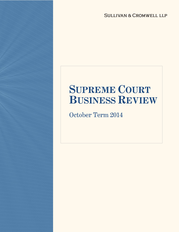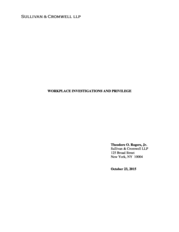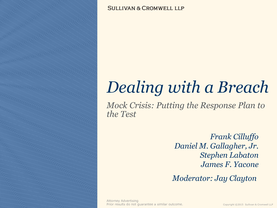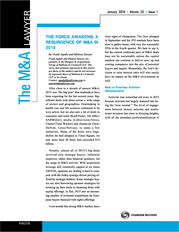Issues When Considering Adoption of a Poison Pill - Frank Aquila – April 19, 2016
Sullivan & Cromwell
Description
unilaterally implement without shareholder action. Under a standstill agreement, the activist
typically agrees to limit its stake in the company, often in exchange for board seats. The Delaware
Court of Chancery has upheld the combination of a standstill agreement with a poison pill in
certain circumstances (In re BioClinica, Inc. S’holder Litig., 2013 WL 673736 (Del.
Ch. Feb. 25, 2013)). C.
SHAREHOLDER COMMUNICATION In most shareholder activism situations, the best supplement to a poison pill is simply communication. As soon as an activist declares its intention to push for certain corporate changes, a board should attempt to establish a line of communication with the activist. An activist might defer more expensive methods of attaining its goals if it feels that the board is willing to listen. Communicating with the activist therefore gives the board more time to line up its defenses and exercise its fiduciary duties.
Sometimes a board is able to provide explanations or resolutions that address the activist’s concerns and the activist will terminate its campaign. Even if the Board is unable to dissuade the Investor, having made the effort to talk with the Investor will help the Board appear more responsive to other shareholders. These communications can make a subsequent pill adoption seem less pernicious. Furthermore, any additional information gathered about the Investor’s plans during the initial discussions puts the Board in a better position to evaluate the nature of the potential threat and devise a more targeted response. At this stage in its campaign, the Investor is probably communicating with other shareholders and institutional investors to drum up support for its causes.
Right now, it is crucial for the Board to maintain an active dialogue with the Company’s shareholders. If a shareholder has confidence in the Board’s overall business strategy, it will be more inclined to perceive the Board’s adoption of a poison pill as a necessary means of protecting shareholder interests, even if the shareholder has general misgivings about corporate defenses. Moreover, shareholders will stand with the Board if they believe in the Board’s vision for the Company, increasing the Board’s leverage in an activist campaign. ****** I look forward to discussing this at your convenience. F.J.A. © 2016 Thomson Reuters.
All rights reserved. Use of Practical Law websites and services is subject to the Terms of Use (http://us.practicallaw.com/2-383-6690) and Privacy Policy (http://us.practicallaw.com/8-383-6692). The Journal | Transactions & Business | April 2016 29 .
Ch. Feb. 25, 2013)). C.
SHAREHOLDER COMMUNICATION In most shareholder activism situations, the best supplement to a poison pill is simply communication. As soon as an activist declares its intention to push for certain corporate changes, a board should attempt to establish a line of communication with the activist. An activist might defer more expensive methods of attaining its goals if it feels that the board is willing to listen. Communicating with the activist therefore gives the board more time to line up its defenses and exercise its fiduciary duties.
Sometimes a board is able to provide explanations or resolutions that address the activist’s concerns and the activist will terminate its campaign. Even if the Board is unable to dissuade the Investor, having made the effort to talk with the Investor will help the Board appear more responsive to other shareholders. These communications can make a subsequent pill adoption seem less pernicious. Furthermore, any additional information gathered about the Investor’s plans during the initial discussions puts the Board in a better position to evaluate the nature of the potential threat and devise a more targeted response. At this stage in its campaign, the Investor is probably communicating with other shareholders and institutional investors to drum up support for its causes.
Right now, it is crucial for the Board to maintain an active dialogue with the Company’s shareholders. If a shareholder has confidence in the Board’s overall business strategy, it will be more inclined to perceive the Board’s adoption of a poison pill as a necessary means of protecting shareholder interests, even if the shareholder has general misgivings about corporate defenses. Moreover, shareholders will stand with the Board if they believe in the Board’s vision for the Company, increasing the Board’s leverage in an activist campaign. ****** I look forward to discussing this at your convenience. F.J.A. © 2016 Thomson Reuters.
All rights reserved. Use of Practical Law websites and services is subject to the Terms of Use (http://us.practicallaw.com/2-383-6690) and Privacy Policy (http://us.practicallaw.com/8-383-6692). The Journal | Transactions & Business | April 2016 29 .













